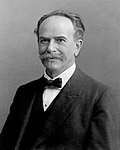Biological anthropology
Biological anthropology, also known as physical anthropology, is a scientific discipline concerned with the biological and behavioral aspects of human beings, their related non-human primates, and their extinct hominin ancestors. This field provides a biological perspective to the systematic study of humans and is a branch of anthropology that has developed a broad range of complex methodologies and approaches. These include the study of human evolution, genetics, primatology, and human adaptation and variation.
Overview[edit]
Biological anthropology seeks to understand the physical human through the lens of evolution, investigating how morphological, physiological, and behavioral traits have enabled humans to adapt to their environments. The field draws upon various disciplines including biology, archaeology, paleontology, and genetics, to form a comprehensive understanding of human development and the diversity of human forms and behaviors across the planet and throughout history.
Subfields[edit]
Biological anthropology is divided into several subfields, each focusing on different aspects of the human and primate condition:
- Primatology: The study of non-human primates, their biology, behavior, and social structures. Primatologists often work in natural habitats to understand the lives of primates in the wild.
- Paleoanthropology: The study of fossil records to understand the process of human evolution and the development of distinct human species.
- Forensic Anthropology: The application of anthropology to legal processes. It involves the identification of skeletal, badly decomposed, or otherwise unidentified human remains.
- Human Biology: This subfield focuses on the biological aspects of human beings, including genetics, adaptation to different environments, and biological responses to nutritional and disease challenges.
- Bioarchaeology: The study of human remains in an archaeological context, aiming to understand the lives, cultures, and societies of past human populations.
Research Methods[edit]
Biological anthropologists employ a variety of research methods to collect data and test hypotheses. These include:
- Fieldwork: Many biological anthropologists conduct research in natural settings or archaeological sites, collecting data on human and primate behavior, diet, and social structures.
- Laboratory Analysis: This involves the examination of genetic material, bones, and other biological samples to understand the physical characteristics, health status, and genetic relationships of humans and primates.
- Comparative Studies: By comparing humans with other primates, researchers can identify what is unique about human biology and behavior.
- Ethnographic Research: Some biological anthropologists engage in ethnographic research, studying the cultural aspects of human societies to understand how culture influences biological and social behavior.
Ethical Considerations[edit]
Biological anthropology, like all research fields that involve living subjects, operates within a framework of ethical considerations. Researchers must ensure the welfare of non-human primates and human subjects, respect the dignity and rights of indigenous peoples, and adhere to legal and ethical standards in the treatment of human remains and archaeological materials.
Conclusion[edit]
Biological anthropology offers invaluable insights into the complexity of human and primate biology, behavior, and evolution. By integrating methods and theories from across the sciences and humanities, it provides a comprehensive understanding of what it means to be human, our place in the natural world, and how we have adapted and evolved over time.
Biological anthropology[edit]
-
Primate skull series with legend
-
Johann Friedrich Blumenbach
-
Franz Boas
Ad. Transform your life with W8MD's Budget GLP-1 injections from $49.99


W8MD offers a medical weight loss program to lose weight in Philadelphia. Our physician-supervised medical weight loss provides:
- Weight loss injections in NYC (generic and brand names):
- Zepbound / Mounjaro, Wegovy / Ozempic, Saxenda
- Most insurances accepted or discounted self-pay rates. We will obtain insurance prior authorizations if needed.
- Generic GLP1 weight loss injections from $49.99 for the starting dose of Semaglutide and $65.00 for Tirzepatide.
- Also offer prescription weight loss medications including Phentermine, Qsymia, Diethylpropion, Contrave etc.
NYC weight loss doctor appointmentsNYC weight loss doctor appointments
Start your NYC weight loss journey today at our NYC medical weight loss and Philadelphia medical weight loss clinics.
- Call 718-946-5500 to lose weight in NYC or for medical weight loss in Philadelphia 215-676-2334.
- Tags:NYC medical weight loss, Philadelphia lose weight Zepbound NYC, Budget GLP1 weight loss injections, Wegovy Philadelphia, Wegovy NYC, Philadelphia medical weight loss, Brookly weight loss and Wegovy NYC
|
WikiMD's Wellness Encyclopedia |
| Let Food Be Thy Medicine Medicine Thy Food - Hippocrates |
Medical Disclaimer: WikiMD is not a substitute for professional medical advice. The information on WikiMD is provided as an information resource only, may be incorrect, outdated or misleading, and is not to be used or relied on for any diagnostic or treatment purposes. Please consult your health care provider before making any healthcare decisions or for guidance about a specific medical condition. WikiMD expressly disclaims responsibility, and shall have no liability, for any damages, loss, injury, or liability whatsoever suffered as a result of your reliance on the information contained in this site. By visiting this site you agree to the foregoing terms and conditions, which may from time to time be changed or supplemented by WikiMD. If you do not agree to the foregoing terms and conditions, you should not enter or use this site. See full disclaimer.
Credits:Most images are courtesy of Wikimedia commons, and templates, categories Wikipedia, licensed under CC BY SA or similar.
Translate this page: - East Asian
中文,
日本,
한국어,
South Asian
हिन्दी,
தமிழ்,
తెలుగు,
Urdu,
ಕನ್ನಡ,
Southeast Asian
Indonesian,
Vietnamese,
Thai,
မြန်မာဘာသာ,
বাংলা
European
español,
Deutsch,
français,
Greek,
português do Brasil,
polski,
română,
русский,
Nederlands,
norsk,
svenska,
suomi,
Italian
Middle Eastern & African
عربى,
Turkish,
Persian,
Hebrew,
Afrikaans,
isiZulu,
Kiswahili,
Other
Bulgarian,
Hungarian,
Czech,
Swedish,
മലയാളം,
मराठी,
ਪੰਜਾਬੀ,
ગુજરાતી,
Portuguese,
Ukrainian



